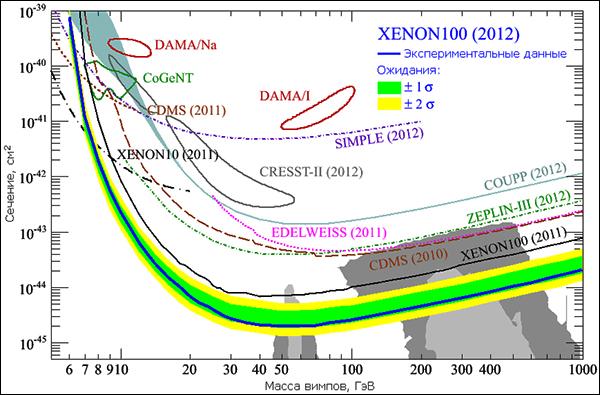Detect dark matter particles XENON100 detector has not yet been
 Bashny.Net
Bashny.Net

225 days of work XENON100 detector failed to detect weakly interacting massive particles of dark matter (WIMPs).
XENON100 is focused on the detection of WIMPs by scattering on nuclei of xenon. Hypothetical interaction of dark matter particles in the volume of the detector leads to the formation of ions Xe +, Xe * excited atoms and electrons. Some of the latter avoids recombination and is carried away from the site of interaction of the electric field, getting to the nearby gas xenon, which creates a scintillation photons that should capture an array of photomultiplier tubes. To suppress the background used passive protection of high-purity copper, polyethylene, lead and water; In addition, the entire installation, placed in an underground Italian National Laboratories of Gran Sasso, protected by a thick layer of rocks.
In April 2011, the collaboration XENON, recall, has already announced that its searches do not bring success. Lately XENON100 still recorded two events that can be interpreted as WIMP interactions with matter, but this result can not be considered significant: it practically does not differ from the expected background level in one event.
However, a negative result is also interesting to physicists because it can always be represented in the form of new, more stringent restrictions on the elastic scattering cross section WIMP-nucleon. After processing the latest information, the participants XENON have ensured that the maximum cross section for WIMP mass of 50-55 GeV decreased to 2 ∙ 10-45 cm² (a year earlier it was 7 ∙ 10-45 cm²). Data on other masses of dark matter particles can be found in the chart above.
Soon curve marking the maximum possible cross section moves even lower, since closing the project XENON100 one is not going to. The experiment, in contrast, will develop the next generation and the detector will receive xenon target larger volume, which automatically makes it more sensitive.
Tags
See also
Physics of elementary particles of your body
Unanswered: 10 phenomena that scientists still cannot explain
How did the Tesla tower power transmission - own investigation
How did the Tesla tower power transmission - own "investigation"
Philae: detail of scientific equipment and the results to date
10 mind-blowing scientific achievements
10 secrets on which science puzzles now
Why time goes only forward, but not backward?
Bridge from nowhere: is it possible to get something out of nothing
Competitor the Big Bang theory. That was a zillion years ago

















